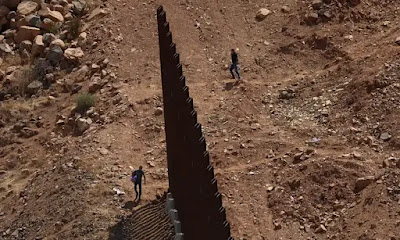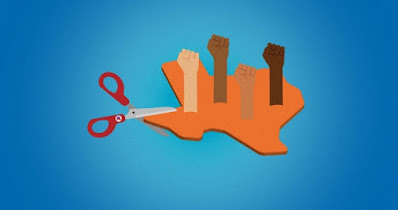Today's News . . . Today's Poem
The New Verse News
presents politically progressive poetry on current events and topical issues.
Guidelines
Submission Guidelines: Send unpublished poems in the body of an email (NO ATTACHMENTS) to nvneditor[at]gmail.com. No simultaneous submissions. Use "Verse News Submission" as the subject line. Send a brief bio. No payment. Authors retain all rights after 1st-time appearance here. Scroll down the right sidebar for the fine print.
Friday, December 31, 2021
THROUGH DESERT CLOUDS
Thursday, December 30, 2021
GODDESS OF THE UNDERWORLD
 |
| A newfound species of millipede (Eumillipes Persephone) has more legs than any other creature on the planet—a mind-boggling 1,300 of them. The leggy critters live deep below Earth's surface and are the only known millipedes to live up to their name. Image credit: Paul E. Marek, Bruno A. Buzatto, William A. Shear, Jackson C. Means, Dennis G. Black, Mark S. Harvey, Juanita Rodriguez, Scientific Reports via LiveScience, December 16, 2021. |
Wednesday, December 29, 2021
BIERSTADT'S CHIMNEY ROCK
 | ||
|
Tuesday, December 28, 2021
LAUGH
FOR JOAN DIDION WHO
Monday, December 27, 2021
IMPRESSIVELY LATE
 |
| Several women’s organisations across [India] have opposed the government’s move to increase the age of marriage of girls from 18 to 21 years, which has been ironically touted as a measure of women’s empowerment. … Similarly, ‘Young Voices: National Working Group’ formed in response to the task force, comprising 96 civil society organisations, in its report published on July 25, 2020, had also opposed this move. The report brought out after surveying about 2,500 adolescents across 15 states stated, “…Increasing the age of marriage will either harm or have no impact by itself unless the root causes of women’s disempowerment are addressed.” —Flavia Agnes, “Increasing Marriage Age for Girls May Only Strengthen Patriarchy,” The Times of India, December 19, 2021 |
Sunday, December 26, 2021
INSPIRATION AND EDUCATION
:: FOUND IN & OF BELL HOOKS
An Erasure Poem by Jen Schneider
Derived from "Appalachian Elegy" (Sections 1-6) by bell hooks (1952-2021)
Activist & writer bell hooks (Gloria Jean Watkins) by SMiLE on the wall at Falafel King Restaurant, Boulder, CO (2017).
Appalachian Elegy (Sections 1-6)
1.
hear them cry
the long dead
the long gone
speak to us
from beyond the grave
guide us
that we may learn
all the ways
to hold tender this land
hard clay direct
rock upon rock
charred earth
in time
strong green growth
will rise here
trees back to life
native flowers
pushing the fragrance of hope
the promise of resurrection
2.
such then is beauty
surrendered
against all hope
you are here again
turning slowly
nature as chameleon
all life change
and changing again
awakening hearts
steady moving from
unnamed loss
into fierce deep grief
that can bear all burdens
even the long passage
into a shadowy dark
where no light enters
3.
night moves
through the thick dark
a heavy silence outside
near the front window
a black bear
stamps down plants
pushing back brush
fleeing manmade
confinement
roaming unfettered
confident
any place can become home
strutting down
a steep hill
as though freedom
is all
in the now
no past
no present
4.
earth works
thick brown mud
clinging pulling
a body down
heard wounded earth cry
bequeath to me
the hoe the hope
ancestral rights
to turn the ground over
to shovel and sift
until history
rewritten resurrected
returns to its rightful owners
a past to claim
yet another stone lifted to
throw against the enemy
making way for new endings
random seeds
spreading over the hillside
wild roses
come by fierce wind and hard rain
unleashed furies
here in this touched wood
a dirge a lamentation
for earth to live again
earth that is all at once a grave
a resting place a bed of new beginnings
avalanche of splendor
5.
small horses ride me
carry my dreams
of prairies and frontiers
where once
the first people roamed
claimed union with the earth
no right to own or possess
no sense of territory
all boundaries
placed by unseen ones
here I will give you thunder
shatter your hearts with rain
let snow soothe you
make your healing water
clear sweet
a sacred spring
where the thirsty
may drink
animals all
6.
listen little sister
angels make their hope here
in these hills
follow me
I will guide you
careful now
no trespass
I will guide you
word for word
mouth for mouth
all the holy ones
embracing us
all our kin
making home here
renegade marooned
lawless fugitives
grace these mountains
we have earth to bind us
the covenant
between us
can never be broken
vows to live and let live
Jen Schneider is an educator who lives, writes, and works in small spaces throughout Pennsylvania. She is a Best of the Net nominee, with stories, poems, and essays published in a wide variety of literary and scholarly journals. She is the author of A Collection of Recollections (Next Chapter), Invisible Ink, On Daily Puzzles: (Un)locking Invisibility and On Crossroads and Fill in the Blank Puzzles (forthcoming, Moonstone Press), and Blindfolds, Bruises, and Breakups (forthcoming, Atmosphere Press).
Saturday, December 25, 2021
CHRISTMAS COMES
 |
| For most of the 19th century, the celebration of Christmas with Christmas trees and gift-giving remained a marginal phenomenon in American society. Most Americans remained skeptical about this new custom. Some felt that they had to choose between older English customs such as hanging stockings for presents on the fireplace and the Christmas tree as proper space for the placing of gifts. It was also hard to find the necessary ingredients for this German custom. Christmas tree farms had first to be created. And ornaments needed to be produced. The most significant steps toward integrating Christmas into popular American culture came in the context of the American Civil War. In January 1863 Harper’s Weekly published on its front page the image of Santa Claus visiting the Union Army in 1862. This image, which was produced by the German-American cartoonist Thomas Nast, represents the very first image of Santa Claus. —Thomas Adam, “How Christmas Became an American Holiday Tradition, with a Santa Claus, Gifts and a Tree,” The Conversation, December 6, 2021 |
SIMILE ARIA
THREE DAYS TO CHRISTMAS
CHRISTMAS CARD
Friday, December 24, 2021
TO BE A WITCH IN SCOTLAND
 |
| From allegations of cursing the king’s ships, to shape-shifting into animals and birds, or dancing with the devil, a satanic panic in early modern Scotland meant that thousands of women were accused of witchcraft in the 16th-18th centuries with many executed. Now, three centuries after the Witchcraft Act was repealed, campaigners are on course to win pardons and official apologies for the estimated 3,837 people–84% of whom were women–tried as witches, of which two-thirds were executed and burned. After a two-year campaign by the Witches of Scotland group, a member’s bill in the Scottish parliament has secured the support of Nicola Sturgeon’s administration to clear the names of those accused, the Sunday Times reported. The move follows a precedent by the Massachusetts House of Representatives in the US that proclaimed victims of the Salem witch trials innocent in 2001. —The Guardian, December 19, 2021 |
Thursday, December 23, 2021
IT'S DÉJÀ VU AGAIN
CATARINA
 |
| The climate crisis is killing migrants trying to cross the US border, study finds. Many undocumented migrants trying to cross the Sonoran desert into the US from Mexico are dying of dehydration and organ failure. Photo: A group of migrants cross the US-Mexico border in Otay Mesa, California. Photograph: AFP/Getty Images via The Guardian, December 16, 2021 |
Wednesday, December 22, 2021
WHITE BIRD
LIMITS OF LANGUAGE
 |
| The shootings never stopped during the coronavirus pandemic, they just became less public, researchers say. —The New York Times, December 1, 2021 |
Tuesday, December 21, 2021
BUILDING MATERIALS
DRAWING THE NEW LINES
 |
| The Biden administration sued Texas…to block its new congressional map, accusing the state of gerrymandering to shut out nonwhite people in violation of federal voting rights law. Attorney General Merrick Garland announced the enforcement action at Justice Department headquarters, saying the redistricting plans Texas adopted in recent months “deny or abridge the rights of Latino and Black voters to vote on account of their race, color or membership in a language minority group.” The Dallas Morning News, December 6, 2021 |
THE NAIL DRIVER
 |
| Sen. Joe Manchin’s (D-W.Va.) announcement that he will vote against the Build Back Better Act rocked the political world on Sunday, with Democrats slamming their fellow colleague and Republicans celebrating the centrist senator’s decision, which effectively kills the party’s chances of passing the behemoth legislation. Sen. Bernie Sanders (I-Vt.), the chairman of the Senate Budget Committee, said [Joe Manchin], the West Virginia Democrat is “gonna have a lot of explaining to do to the people of West Virginia” because he “doesn’t have the guts to stand up to powerful special interests.” —The Hill, December 19, 2021 |





